- Home
- Robin McKinley
The Blue Sword d-1 Page 4
The Blue Sword d-1 Read online
Page 4
"We have singing and dancing too," said Cassie.
"Yes, I know," said Beth slowly; "but it's not the same. Our dancing is just working it off, after being inside for so long. Theirs means something."
Harry looked at her curiously. "You mean asking the gods for a good year—that kind of thing?"
"I suppose so," said Beth. "I'm not quite sure."
"No one will talk about anything really Darian to Homelanders," said Cassie. "You must have noticed it."
"Yes—but I'm new here."
"You're always new here if you're a Homelander," said Cassie. "It's different in the south. But we're on the Border here, and everyone is very aware that Freemen live in those Hills you see out your windows every day. The Darians that do work for you, or with you, are very anxious to prove how Homelander they really are, and loyal to all things Homelander, so they won't talk; and the others won't for the opposite reasons."
"You're beginning to sound like Daddy," said Beth.
"We've heard him say it all often enough," Cassie responded.
"But the Hillfolk," said Harry.
"Yes. The one thing I suppose we all have in common is a joy in those three short weeks of spring. So a few Hillfolk come to our Fair."
"They don't act very happy, though," said Beth. "They come in those long robes they always wear—over their faces too, so you can't see if they're smiling or frowning; and some of them with those funny patched sashes around their waists. But they do come, and they stay several days—they have the grandest horses you've ever seen. They pitch camp outside the station, and they always set guards, quite openly, as if we weren't to be trusted—"
"Maybe we aren't," murmured Cassie.
"—but they never sell their horses. They bring the most gorgeous tapestries, though, and embroidered sashes—much nicer than the cut-up ones they wear themselves. These they sell. They stalk around the edge of the big central square, the old marketplace, carrying all this vivid stuff, while the rest of us are laughing and talking and running around. It's a bit eerie."
"No it's not," said Cassie. "You listen to the stories too much."
Beth blushed. After a pause she said, "Do you see anything at the Residency?"
"No," said Harry. "What stories?"
There was another pause while Cassie looked at Beth and Beth looked at her pony's mane. "My fault," said Cassie presently. "We're not supposed to talk about them. Daddy gets really annoyed if he catches us. The stories are mostly about magic. Corlath and his people are supposed to be rotten with it, even in this day and age, and Corlath himself is supposed to be more than a little mad."
"Magic?" said Harry, remembering what Dedham had said earlier. "Mad?" He hadn't said anything about madness. "How?"
They both shrugged. "We've never managed to find out," said Cassie.
"And we can usually wring what we want to know out of Daddy eventually," said Beth, "so it must be something pretty dreadful."
Cassie laughed. "You read too many novels, Beth. It's just as likely that Daddy won't talk about it because he refuses to admit it might be real—the magic, I mean. Jack Dedham believes it—he and Daddy argue about it sometimes, when they don't think anyone else is around. The madness, if that's what it is, is tied up somehow in the king's strength—in return for having power beyond mortal men or some such, he has to pay a price of some kind of mad fits."
"Who reads too many novels?" said Beth, and Cassie grinned. "It does rather catch the imagination," she said, and Beth nodded.
"No wonder you're so eager to set eyes on him," said Harry.
"Yes. I know it's silly of me, but I feel maybe it'll show somehow. He'll be eight feet tall and have a third eye in the middle of his forehead," said Beth.
"Heavens," said Harry.
"I hope not," said Cassie.
"Well, you know how the legends go," said Beth.
"No, not really," said her sister repressively. "Even when Daddy is willing to translate some, you can tell by the pauses that he's leaving a lot out."
"Yes, but even so," persisted Beth. "The old kings and queens were supposed to be taller than mortal—"
"The Darians are mostly shorter than we are, at least the ones we see," interrupted Cassie. "A king could look quite ordinary to us and be very tall for them."
"—and you can tell the royal blood by something about the eyes."
There was another pause. Harry said, "Something?"
Again they both shrugged. "Something," said Beth. "That's one of the things Daddy always leaves out. Like the madness."
"You're hoping he'll froth at the mouth," said Cassie.
Beth threw a peevish look at her sister. "No. I'll settle for the third eye."
This conversation had taken them well away from the outlying houses of the station, and the dust kicked up by their ponies' feet was giving up even the pretense of being anything other than desert sand. A silence fell; Cassie suggested a canter, which was duly accomplished. The sun was hot enough that when they pulled up again, after only a few minutes, the ponies' shoulders were dark with sweat. Harry sent another of her long looks across the desert, and had to squint against the shivering light.
"Do you think we might turn back now?" Beth asked wistfully, shading her eyes with an elegantly white-gloved hand.
Harry grinned. "We can spend the rest of the morning in my sitting-room, if you like. It overlooks the front door, you know."
Beth gave her a grateful look, Cassie chuckled; but they all three turned their ponies' heads with dispatch and sent them jogging homeward as quickly as the heat would allow.
By the time they reached the suggestion of shade offered by the thin determined trees marking the outskirts of the station proper, Harry was hot and slightly headachy, and cross with herself for rushing back for no reason. Nothing could have escaped their notice; the Residency stood a little apart from the rest of the station, in its own grounds, and the road that ended at its front door had been under their eyes for the entire ride. They had been gone only a little over an hour. Harry considered suggesting that they meet again after another hour, time enough to change and have a bath; in her present condition she didn't feel like meeting any kings, mad or otherwise.
But she stole a glance at Beth and saw how anxious she was not to miss anything; and she thought, Oh well, I can wash my face at least, and we can all have some cold lemonade, and watch the front door in comfort.
The horses walked slowly up the street to the Residency. Cassie pulled off her hat and fanned herself with it. Harry shut her eyes for a moment. An execrable habit, she told the insides of her eyelids. What if this fat sleepy fourposter with ears and a tail should bolt, or shy suddenly? What if the sky should fall? responded the insides of her eyelids.
The fourposter stopped dead in the road and raised its head a few inches just as Beth said in a strangled whisper: "Look."
Harry and Cassie looked. They had come nearly to the end of the road; what was left was the broad circle in front of the Residency, suitable for turning carriages in, or forming up half a regiment. Off to one side, where the tall house cast a little shade, seven horses and one man stood. The horses stood in a little semicircle around the man, who sat cross-legged near the wall of the house. They stood quietly, stamping a foot now and then, and occasionally one would put out its nose to touch the man; and he would stroke its cheek a moment, and it would raise its head again. The first thing Harry noticed was the beauty of these animals; not a one was less than sixteen hands high, with long clean legs and tails that nearly touched the ground. Three were chestnuts, their coats shining even in the dusty shadow; one grey, one dark bay, one golden dun; but the finest horse stood farthest from three fat ponies standing foolishly in the carriage drive. He was a blood bay, red as fire, with black legs and tail; he stood aloof from the other horses and ignored the man at his feet. He stared back at the newcomers as if it were his land he stood on, and they intruders. As the other horses slowly swung their heads around to see what their le
ader was looking at, Harry noticed something else: they wore no bridles.
"He's here," said Cassie flatly.
Beth drew a deep breath. "How?" she said.
"Look at those horses," said Harry, and the longing in her voice was so clear that even she heard it.
Cassie looked away from the impossible sight of seven horses that had made their way invisibly across a bleak desert right in front of three people who were looking for them, and smiled with sympathy at her friend. "Haven't you ever seen a Hill horse before? They're supposed to be the finest in Daria."
"And they never sell them," said Harry, remembering.
Cassie nodded, although Harry's eyes never left the horses. "Jack Dedham would give an arm even to ride one once."
"No bridles," said Harry.
"No stirrups, either," said Cassie, and Harry saw that this was true. They wore saddles that were little more than padded skins, cut and elegantly rolled; and she could see the gleam of embroidery on girths and pommels. Not a horse moved from its place in the semicircle, although all now, with the man, watched the three ponies and their riders.
"Horses," said Beth disgustedly. "Don't you understand what they mean? They mean that he's here already, and we never noticed a thing. If that's not magic, what is?" She prodded her pony forward again. Cassie and Harry followed slowly and stopped before the steps. Three stable boys appeared, ready to take the ponies back to the stable behind the house.
Harry's feet had only just touched the ground—the boy hovering anxiously to one side, since he had learned through bitter experience that this Homelander did not wish to be assisted while dismounting—when there was a commotion at the entrance to the house. Harry turned around in time to see the heavy door thrown violently open, so that its hinges protested; and out strode a man dressed in loose white robes, with a scarlet sash around his waist. Several more figures darted out in his wake, and collected around him where he paused on the verandah. He was the axis of a nervous wheel, moving his head slowly to examine the lesser people who turned around him and squeaked at him without daring to come too near. With a shock Harry recognized four of these small mortals: Sir Charles and Mr. Peterson, Jack Dedham and her own brother, Richard. The man in white was tall, though no taller than Richard or Sir Charles. But there was a quivering in the air around him, like the heat haze over the desert, shed from his white sleeves, cast off by the shadows of his scarlet sash. These who stood near him looked small and pale and vague, while this man was so bright he hurt the eyes. More men came quietly out behind the Homelanders and stood a little to one side, but they kept their eyes on their king. He could be no one else. This must be Corlath.
Harry took a deep breath. He didn't look insane or inhuman. He did look uncooperative. He shook his head and frowned at something someone said, and Sir Charles looked very unhappy. Corlath shrugged, and made a sweeping movement with his arms, like a man coming out of a forest gratefully into the sunlight. He took a long step forward to the edge of the verandah. Then Dedham took two quick steps toward him and spoke to him, a few words only, urgently; and Corlath turned again, as it seemed unwillingly, and looked back. Dedham held out his hand, palm down and fingers spread; and so they stood for a long minute. Corlath dropped his eyes to the hand stretched toward him, then looked into the face of its owner. Harry, watching, held her breath without knowing why.
With a nasty feeling in the pit of her stomach she saw a look of terrible strain cross Dedham's face as the Hill-king held his gaze; and the outstretched hand trembled very slightly. Corlath slowly reached out his own hand and touched the back of Dedham's wrist with two fingers; the hand dropped to Dedham's side once more, but as if it were heavy as stone, and the man slumped in relief like a murderer reprieved at the scaffold. The look of strain slid off his face to be replaced by one of great weariness.
Corlath swung around again, and set his foot on the top stair, and no one moved to stop him. Five men in the loose robes of the Hillfolk separated themselves from the verandah shadows and made to follow. Harry found she could not take her eyes off the king, but from the corners of her eyes she noticed that the other men too wore vivid sashes: gold and orange and green and blue and purple. There was nothing to indicate the king but the glitter of his presence.
Harry stood only a few feet from the bottom step, holding her pony's bridle. Cassie and Beth were somewhere behind her, and the stable boy stood frozen a few steps from her elbow. Corlath still had not noticed them, and Harry stared, fascinated, as he came nearer. There seemed a roaring in the air that beat on her eardrums and pressed against her eyeballs till she blinked. Then he looked up abruptly, as if from some unfathomable depth of thought, and saw her: their eyes met.
The man's eyes were yellow as gold, the hot liquid gold in a smelter's furnace. Harry found it suddenly difficult to breathe, and understood the expression on Dedham's face; she almost staggered. Her hand tightened on the bridle, and the pony dropped its head and mouthed the bit uncomfortably. The heat was incredible. It was as though a thousand desert suns beat down on her. Magic? she thought from inside the thunder. Is this what magic is? I come from a cold country, where the witches live in cool green forests. What am I doing here? She saw the anger the man was holding in check; the anger stared at her through the yellow eyes, and swept through the glistening white robes. Then it was over. He looked away; he came down the last steps and past her as if she did not exist; and she cowered out of his way so that no corner of his white sleeve should touch her. The man with the horses emerged from the shade, riding one of the chestnuts; and the six others went up to their riders and nuzzled them. The blood bay reached the king first, and greeted him with a low whinny. Corlath mounted with an easy leap Harry could not even follow with her eyes, although she could see anger informing the set of his legs against the great stallion's sides. The horse felt it too; without moving, all its muscles were suddenly taut, and its stillness was the quiet before battle. The other men mounted. Corlath never looked at them, but the red stallion plunged forward at a gallop, and the other men followed; and the sound the horses' hooves made on the hard earth suddenly reminded Harry how unnaturally silent everyone had been since Dedham's last words. The inaudible thunder faded with the sight of the colored sashes and the bright flanks of the Hill horses. Harry woke up to who she was, and where; Sir Charles and Jack and Mr. Peterson looked their normal size again, and she had a raging headache.
CHAPTER THREE
Corlath stared at his horses black-tipped ears. The Hillfolk passed through the gate of the Residency and Corlath lifted his gaze to rake angrily across the dusty station street, the little dun-colored houses and shops, the small straggly trees. At a slight shift in his rider's weight the red horse turned off the road. The harsh clatter of hooves on the packed-dirt road changed to the duller sound of struck sand. He could hear his men turning off the road behind him; he shook his head in a futile attempt to clear a little space for thought amid the anger, and leaned back in his saddle, and the horse's pace slowed. There was no sense in charging across the desert at midday; it was hard on the horses.
The six riders closed up behind him; the two who came forward to ride at his side stole quick looks at him as they came near, and looked away again as quickly.
Outlanders! Involuntarily his hands, resting lightly on his thighs, curled into fists. He should have known better than even to try to talk to them. His father had warned him, years ago. But that was before the Northerners had come so near. Corlath blinked. The heat of his own anger was hard to contain when there wasn't some use he could put it to; anger was splendidly useful on the battlefield, but he was not facing any regiments just now that could be tangled in their own feet and knocked over in companies. Much as he would like, for example, to set fire to the big stupid house—an absurd building for the desert: it must be the sort of thing they lived in in their own country—and watch it crash down around the ears of the big soft creature who called himself commissioner … but spite was for children, and
he had been king for thirteen years, and he bit down on his anger and held it.
He remembered when he was young and before the full flowering of his kelar, of the terrible strength known ironically as the "Gift," his father had told him that it would often be like this: "We aren't really much good, except as battle machines, and even there our usefulness is limited. You'll curse it, often enough, far more often than you'll be glad of it, but there you are." He sighed, and looked wryly at his son. "They say that back in the Great Days it was different, that men were made big enough to hold it—and had wit enough to understand it. It was Lady Aerin, the story goes, that first knew her Gift and broke it to her will, but that was long ago, and we're smaller now."
Corlath had said, hesitantly: "They say also that the Gift was once good for other things: healing and calming and taming."
His father nodded sadly. "Yes; perhaps it once was; but no more. Luthe knows, if he will tell you, for he has the old kelar, and who his parents are even he has forgotten; but Luthe is himself. You and I are of duller blood.
"And it is duller blood that has brought us to what we are, what we remain—what remains to us. Avoid the Outlanders, if you can. They can't, or won't, understand us; they don't recognize horses from oxen, and will try to put the yoke on you that they have hung on the rest of our land. But their strength is the strength of numbers and of stubbornness and persistence; do not underestimate it."
He could see his father standing in one of the inner courtyards of the City in the mountains, staring at one of the fountains, water running shining over the colored stones of the Hills, talking half to himself. Then the picture faded, blotted out in another swift sweep of anger; and he found himself looking at the girl again, the girl he had seen standing in front of the Outlander house. What had she to do with anything?

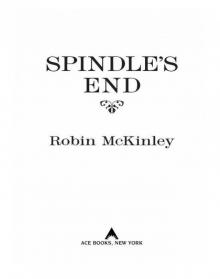 Spindle's End
Spindle's End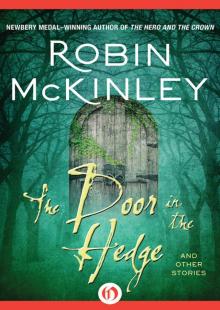 The Door in the Hedge: And Other Stories
The Door in the Hedge: And Other Stories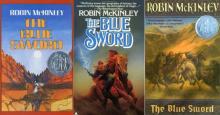 The Blue Sword
The Blue Sword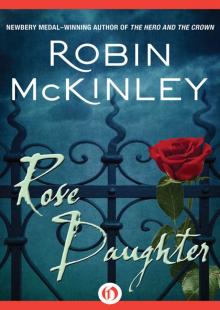 Rose Daughter
Rose Daughter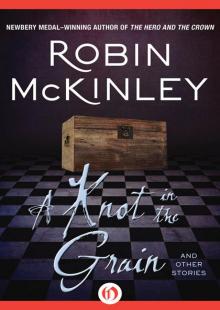 A Knot in the Grain and Other Stories
A Knot in the Grain and Other Stories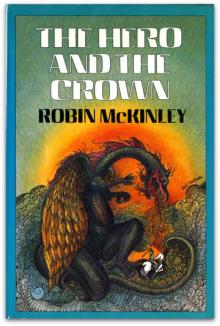 The Hero And The Crown
The Hero And The Crown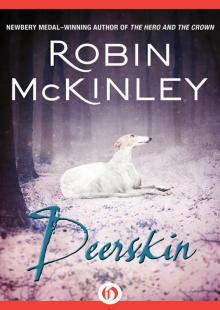 Deerskin
Deerskin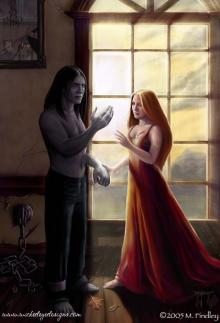 Sunshine
Sunshine Beauty: A Retelling of the Story of Beauty and the Beast
Beauty: A Retelling of the Story of Beauty and the Beast Shadows
Shadows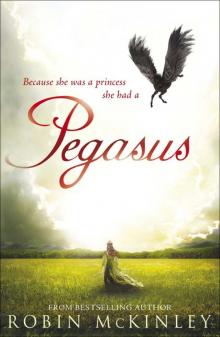 Pegasus
Pegasus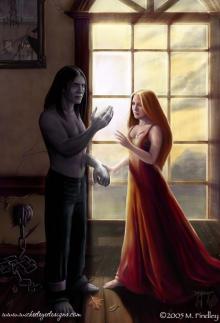 Chalice
Chalice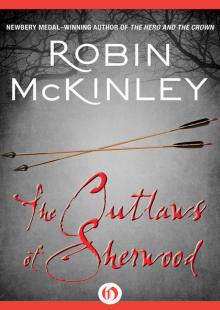 The Outlaws of Sherwood
The Outlaws of Sherwood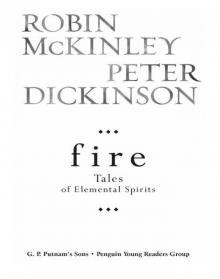 Fire: Tales of Elemental Spirits
Fire: Tales of Elemental Spirits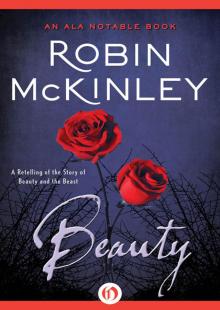 Beauty
Beauty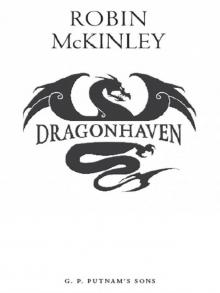 Dragon Haven
Dragon Haven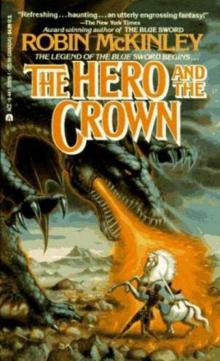 The Hero And The Crown d-2
The Hero And The Crown d-2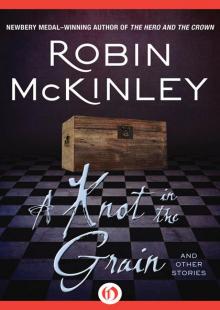 A Knot in the Grain
A Knot in the Grain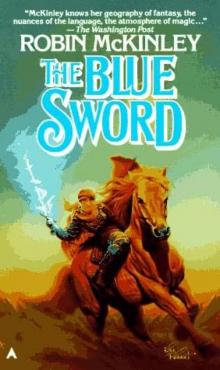 The Blue Sword d-1
The Blue Sword d-1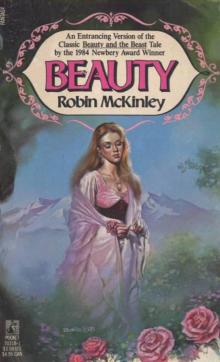 Beauty (v1.2)
Beauty (v1.2)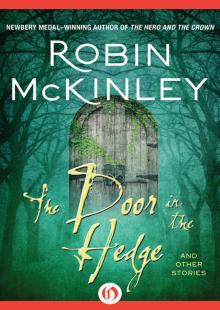 The Door in the Hedge
The Door in the Hedge